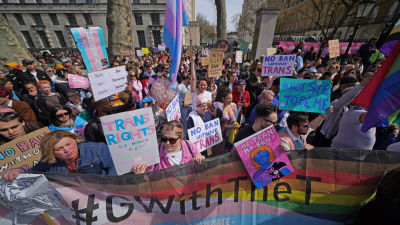Labour government will ban gay and trans 'conversion therapy'

Is it third time lucky for campaigners who want to ban so-called conversion therapy?
After being announced by monarchs twice already under Conservative governments, today King Charles yet again said that his government - this time a Labour one - would ban attempts to change someone's sexuality or gender identity.
It was Theresa May who first made the pledge back in 2018, following a series of investigations by ITV News.
Recent research by LGBT+ anti-abuse charity Galop in 2022 found that one in five LGBT+ people had been subjected to someone trying to cure or suppress their identity.
But Boris Johnson tried to ditch the proposed ban when he took office before ITV News leaked his intentions and Conservative MPs forced him into a U-turn.
Then Rishi Sunak's government delayed the pledge again, omitting it from last year's King's Speech.
Part of the reason is that there has been intense debate in recent years in relation to banning so-called trans conversion therapy.
Some of that is about the broader debate to do with sex and gender, which rages at high temperatures and often sparks angry exchanges.
The recent Cass Review has also intensified the discussion around gender transition among children.
But there are more specific concerns about possible unintended consequences of a ban, namely that it might accidentally criminalise parents, therapists or doctors who attempt to explore a person's gender identity with good intentions.
Labour has been clear that there will be a "full, trans-inclusive ban", which the Conservatives were rapidly backing away from.
But the new government is also clear that the ban "must not cover legitimate psychological support, treatment or non-directive counselling".
It also says it recognises the "important role that teachers, religious leaders, parents and carers can have in supporting those exploring their sexual orientation or gender identity".
Drawing careful parameters in law could be difficult, which is why the government has promised a "draft bill" at this stage, which will allow for parliamentary debate about the wording.
Campaigners insist all of this is possible to navigate. But a ban remains some way off.
Have you heard our new podcast Talking Politics? Tom, Robert and Anushka dig into the biggest issues dominating the political agenda in every episode…